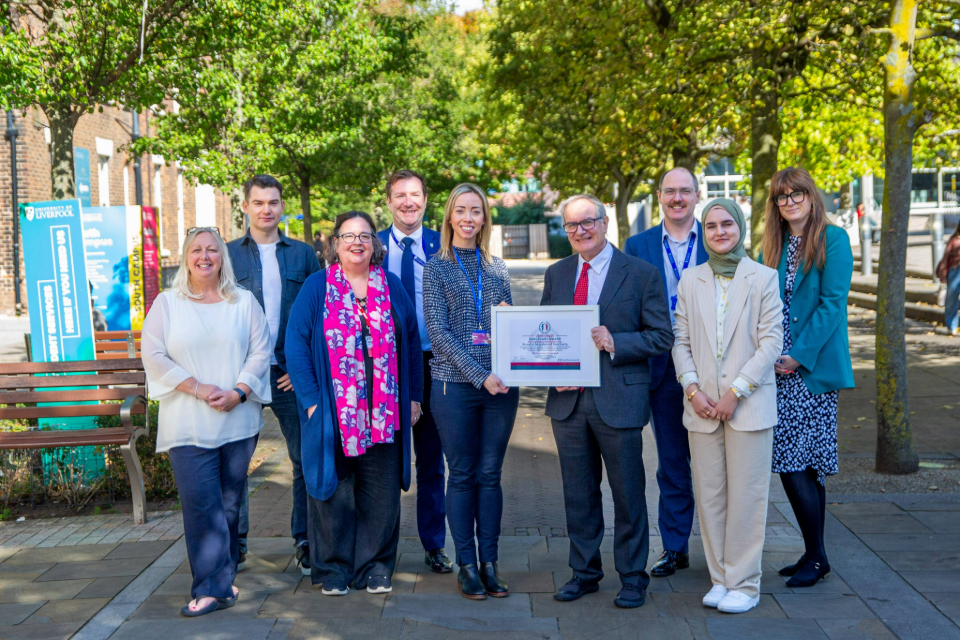
The University of Liverpool has been awarded ‘University of Sanctuary’ status by City of Sanctuary UK, reflecting its efforts to make the institution a place of safety, solidarity and empowerment for people seeking sanctuary.
It has also officially launched its new Refugee Hub. The Hub is a collaborative network that connects people with lived experience, the University’s staff and student community, and local organisations. It creates opportunities to share resources, contribute voices to the University’s work, and embody the principles of the Sanctuary award.
Together, these milestones confirm the University’s commitment to collaboration with refugee communities, widening access to higher education and amplifying the voices of people with lived experience of displacement.
The Hub has been developed internally by researchers from the Institute of Population Health, with support from the University’s Widening Participation Team, and benefited from engagement across the University’s staff and student community. Significantly, the hub is co-led by Asylum Link Merseyside, with the involvement of other local organisations including Action Asylum, Merseyside Refugee Support Network and Bridge2, who have played a vital role.
Professor Richard Black, Provost and Deputy Vice-Chancellor said: “The University of Liverpool is a truly inclusive institution, and we take pride in the life-transforming opportunities we provide for all our students, regardless of their background or circumstances. I am immensely proud that we have been awarded University of Sanctuary status. This recognition reflects our ongoing commitment to creating a safe, stimulating and welcoming community in particular for students whose studies have been interrupted by war and persecution.
“Students who have benefitted from our Sanctuary scholarships speak powerfully about their transformative impact, and it is crucial that we continue to expand these opportunities for those facing such challenging circumstances. I am immensely grateful to those who have contributed their energy, enthusiasm and external funding to help make this possible”
Omar*, a 20-year-old Computer Science student at the University of Liverpool underlined the life-changing impact of Sanctuary Scholarships in practice: “Fleeing the war in Syria and arriving in the UK left me with some harsh realities; the most painful being my lack of access to student finance. It felt as though my dreams of higher education were crumbling. Receiving the University of Liverpool’s Asylum Seeker Scholarship was a pivotal turning point in my life, transforming fear and uncertainty into opportunity and hope. The support extended far beyond financial help, as it included understanding and welcoming staff, and an encouraging environment that made me feel truly valued. This support has not only funded my studies but has allowed me to participate fully in university life.”
A spokesperson from City of Sanctuary UK said: “City of Sanctuary UK is proud to recognise the University of Liverpool as a University of Sanctuary. This award highlights the university’s strong commitment to creating a culture of welcome and opportunity, ensuring that people seeking sanctuary are supported to learn, thrive, and contribute as valued members of the university community.”
To secure this award, the University pledged to uphold the City of Sanctuary charter values and principles and signed the United Nations High Commissioner for Refugees (UNHCR) Global Pledge to expand refugee access to higher education.
The University now provides up to four Sanctuary Scholarships each year for undergraduate students seeking asylum in the UK, and two to three Humanitarian Scholarships for master’s students with refugee status outside the UK. One of these scholarships is dedicated to law, funded by the School of Law and Social Justice.
Since 2009, the University has been a member of the Council for At-Risk Academics (Cara), offering sanctuary to six fellows, some of whom have gone on to join the University as permanent staff. The University also maintains a twinning arrangement with Sumy State University in Ukraine, regularly hosting staff for conferences and workshops. In addition, it has provided placements for three British Academy Researchers at Risk Fellows from Ukraine, enabling them to continue their academic work in a peaceful environment. Since the start of the summer 2025, the University has been working closely with Universities UK and the UK Government to support scholarship holders from Gaza so that they can take up university places.
Lal Bakht Sharifi, Asylum Link volunteer and Hub co-developer, summed up the significance of the new network: “I believe discussions about asylum seekers and refugees in places such as the Refugee Hub can raise awareness about the challenges they face and debunk some of the myths surrounding them. This can be helpful in the way people may treat or think about them. Hopefully some of its outcomes can solve some refugee problems.”
The Refugee Hub has been supported by the Participatory Research Fund (Faculty of Health and Life Sciences Public Engagement Team) and will serve as a cornerstone of the University’s work as a University of Sanctuary, ensuring that collaboration, inclusion, and the perspectives of people with lived experience continue to guide its future direction.
*Omar’s name has been changed to protect their identity.